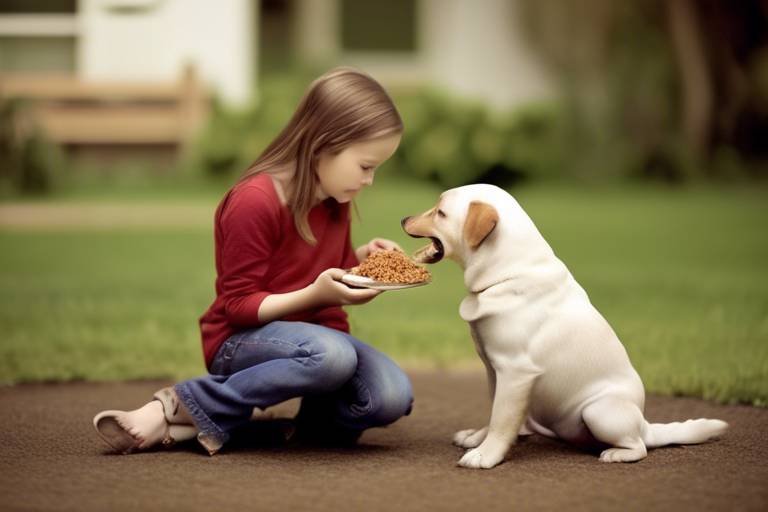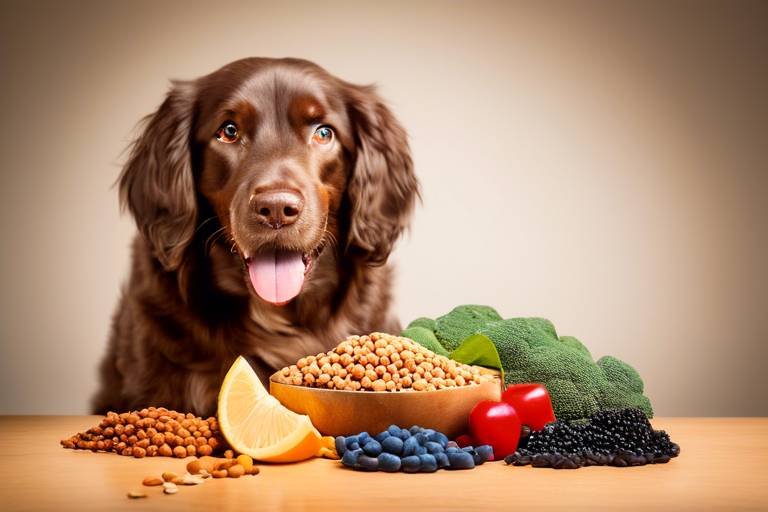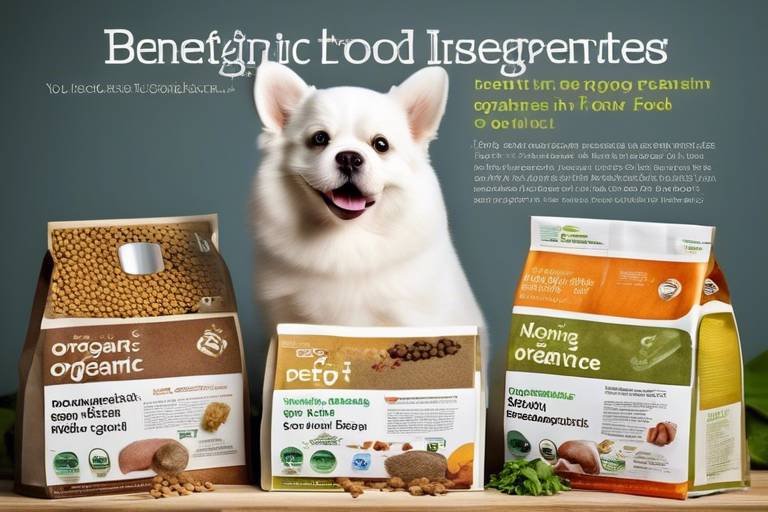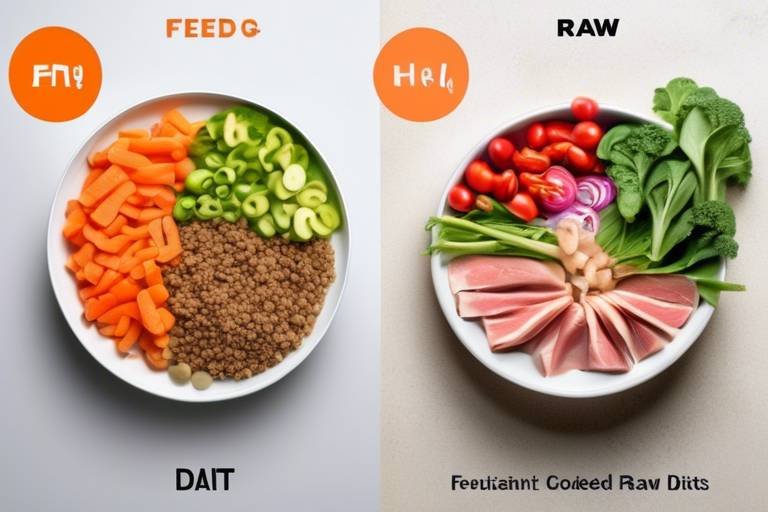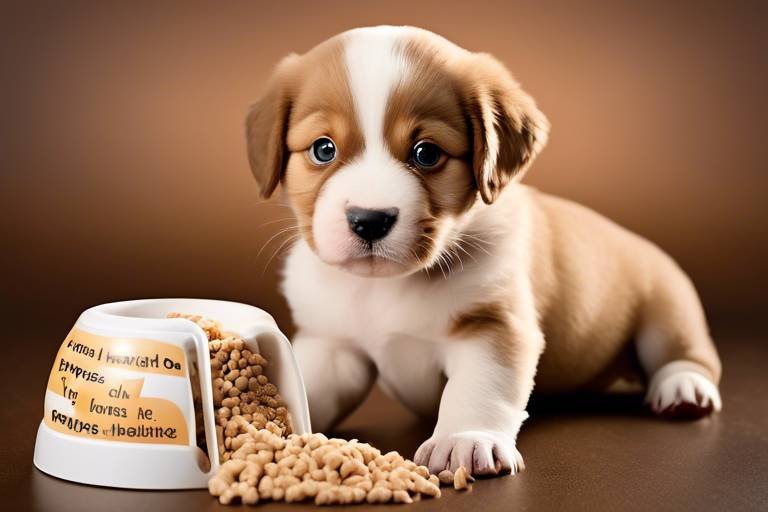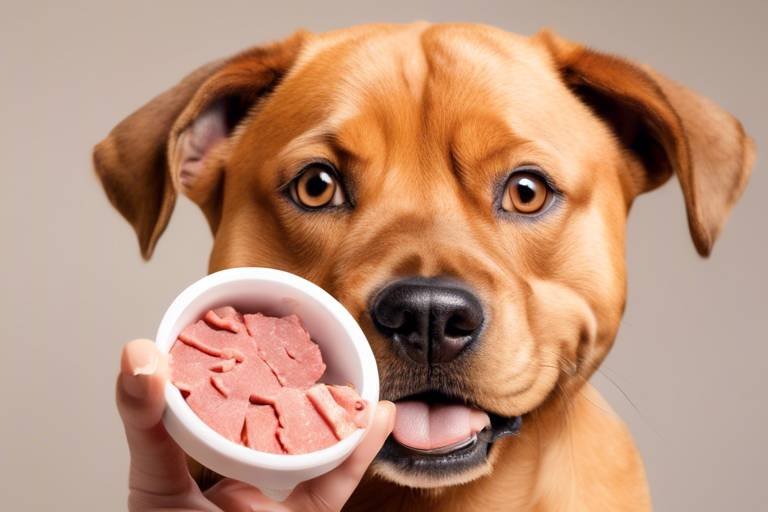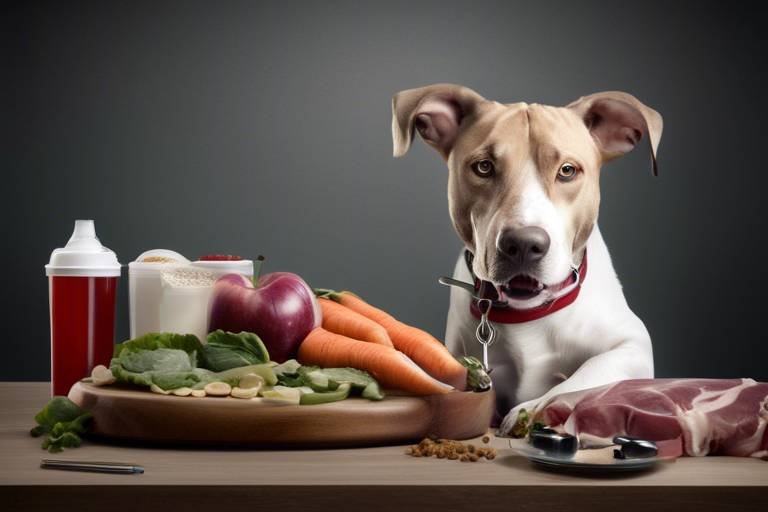The Importance of Nutrition for Growing Puppies
Nutrition is not just a buzzword; it’s the very foundation upon which your puppy’s health, growth, and happiness are built. Just like a house needs a solid foundation to stand tall, your furry friend needs the right nutrients to thrive. Imagine your puppy as a little sponge, soaking up everything they need to grow into a strong, healthy adult dog. Every bite they take plays a crucial role in their development, influencing everything from their energy levels to their immune system. So, what exactly does a growing puppy need to flourish? Let’s dive into the essential nutrients that are vital for their growth and well-being.
Understanding the specific nutrients that puppies require is crucial for their growth. Puppies are in a rapid phase of development, and their bodies need a balanced diet rich in proteins, fats, carbohydrates, vitamins, and minerals. Each nutrient plays a unique role:
- Proteins: These are the building blocks of your puppy’s body. They help in muscle development, tissue repair, and overall growth.
- Fats: Essential fatty acids provide energy and support brain development. They also keep your puppy's coat shiny and healthy.
- Carbohydrates: These are important for energy. They help your puppy stay active and playful, which is crucial for their social development.
- Vitamins and Minerals: These micronutrients support various bodily functions, including bone growth, immune health, and metabolic processes.
Each of these nutrients works in harmony to ensure that your puppy grows into a healthy dog. Think of it like a well-orchestrated symphony; every instrument (or nutrient) has its part to play, and when they come together, they create something beautiful.
Now that we understand the nutrients, the next big question is: how do you choose the right food for your puppy? With so many options available, it can feel a bit overwhelming. But don’t worry, we’re here to break it down for you. When selecting puppy food, consider the following:
- Age and breed of your puppy
- Specific dietary needs or allergies
- Quality of ingredients
It’s important to choose food that is specifically formulated for puppies, as their nutritional needs are different from adult dogs. Look for brands that list meat as the first ingredient and avoid those with fillers like corn or soy.
When it comes to feeding your puppy, you have two main options: commercial puppy food or homemade diets. Each has its pros and cons, and understanding them can help you make an informed decision.
Commercial puppy foods are scientifically formulated to meet the nutritional needs of growing puppies. They offer convenience, as they are readily available and require no preparation. Additionally, they come with guaranteed nutrient profiles, so you can be confident that your puppy is getting what they need.
On the other hand, homemade diets allow for customization based on your puppy's specific needs. You have complete control over the ingredients, which can be beneficial if your puppy has food allergies or sensitivities. However, it’s essential to ensure that homemade meals are balanced and meet all nutritional requirements.
Feeding guidelines can vary widely depending on your puppy’s breed and age. Generally, puppies should be fed three to four times a day until they reach six months of age. As they grow, you can gradually transition to two meals a day. Pay close attention to portion sizes; overfeeding can lead to obesity, while underfeeding can stunt growth.
Many puppy owners make dietary mistakes that can hinder growth. Here are some common pitfalls to avoid:
- Overfeeding: It’s tempting to give your puppy extra treats, but this can lead to obesity and health issues.
- Underfeeding: On the flip side, not providing enough food can stunt growth and development.
- Feeding Human Foods: Certain human foods can be toxic to dogs, so always check before sharing your meals.
Food allergies can impact a puppy's health in various ways. Signs may include itching, digestive issues, or skin problems. If you suspect your puppy has a food allergy, it’s best to consult a veterinarian for proper diagnosis and treatment.
While supplements can be beneficial, over-supplementation can lead to health issues. It's important to understand when supplements are necessary and how to use them appropriately. Always consult with your vet before adding any supplements to your puppy's diet.
Hydration is often overlooked in puppy nutrition. Fresh water is crucial for digestion, nutrient absorption, and overall health. Make sure your puppy has access to clean water at all times, especially during and after meals.
Q: How often should I feed my puppy?
A: Puppies should be fed three to four times a day until they are about six months old, then you can transition to two meals a day.
Q: Can I give my puppy human food?
A: Some human foods are safe, but many can be harmful. Always check with your vet before sharing your meals.
Q: What should I do if I suspect my puppy has a food allergy?
A: Consult your veterinarian for proper diagnosis and treatment options.
Q: Is homemade puppy food better than commercial food?
A: Both have their benefits. Homemade food allows for customization, while commercial food is formulated to meet nutritional needs. Choose what works best for you and your puppy.

The Role of Nutrients in Puppy Growth
When it comes to raising a healthy puppy, understanding the role of nutrients in their growth is absolutely essential. Just like humans, puppies require a balanced diet rich in various nutrients to support their rapid development. Imagine your puppy as a tiny, growing machine that needs fuel to run smoothly. If you don’t provide the right kind of fuel, that machine can break down, leading to health issues down the line.
One of the most important nutrients for puppies is protein. This macronutrient is crucial for building and repairing tissues, including muscles, skin, and organs. Puppies are in a constant state of growth, so they need higher protein levels than adult dogs. A good rule of thumb is to look for puppy food that contains at least 22% protein. Sources like chicken, beef, and fish are excellent options that pack a protein punch!
Next up, we have fats, which are not just a source of energy, but also play a vital role in brain development and maintaining healthy skin and coat. Fats are rich in essential fatty acids, such as Omega-3 and Omega-6, which are crucial for cognitive function and overall health. Aim for puppy food that includes healthy fats like fish oil or chicken fat, providing around 8% to 20% fat content.
Carbohydrates are another key player in your puppy’s diet. They serve as a quick energy source and help with digestion. However, not all carbs are created equal! Look for high-quality sources like brown rice, sweet potatoes, and oats, rather than fillers like corn and soy, which offer little nutritional value. Carbs should make up around 30% to 50% of your puppy's diet.
Vitamins and minerals are the unsung heroes of puppy nutrition. They help support immune function, bone health, and overall metabolic processes. For example, calcium and phosphorus are critical for developing strong bones and teeth. A well-balanced puppy food will typically provide all the necessary vitamins and minerals, but if you’re considering homemade options, be sure to consult with a veterinarian to ensure your puppy is getting everything they need.
To summarize, a balanced diet for your puppy should include:
- Protein: 22% minimum
- Fats: 8% to 20%
- Carbohydrates: 30% to 50%
- Vitamins and Minerals: Essential for overall health
In essence, every nutrient plays a vital role in ensuring your puppy grows into a healthy adult dog. The right balance of these nutrients not only supports physical growth but also promotes a strong immune system, healthy skin, and a shiny coat. So, the next time you’re shopping for puppy food, remember that it’s not just about filling their bowl; it’s about providing the building blocks for a happy, healthy life!

When it comes to choosing the right puppy food, it can feel like finding a needle in a haystack. With so many options available, how do you know what’s best for your furry friend? The first step is to understand that puppies have specific nutritional needs that differ from adult dogs. They require a balanced diet rich in essential nutrients to support their rapid growth and development. So, let’s dive into the world of puppy food and make it a little less overwhelming!
One of the first decisions you’ll face is whether to opt for commercial puppy food or to prepare homemade meals. Each option has its pros and cons, and it’s important to weigh them based on your puppy’s unique needs. Commercial puppy foods are often designed to provide a complete and balanced diet, ensuring that your pup gets everything they need in one convenient package. On the other hand, homemade diets allow you to control the ingredients, which can be particularly beneficial if your puppy has food sensitivities or allergies.
Let’s break down some key factors to consider when selecting puppy food:
- Age and Size: Puppies come in all shapes and sizes, and their dietary needs can vary significantly. Larger breeds may require different nutrients than smaller breeds, so always check the packaging for age and size recommendations.
- Life Stage: Look for foods specifically labeled for puppies. These formulas are designed to support growth and contain higher levels of protein and fat compared to adult dog food.
- Ingredient Quality: Always read the ingredient list. High-quality puppy foods should list a source of protein, such as chicken or lamb, as the first ingredient. Avoid foods with vague terms like “meat by-products” or “animal fat.”
- Brand Reputation: Do some research on the brands you’re considering. Look for companies that have a good track record for safety and quality.
Another important aspect to consider is the type of food. You’ll generally find three main types of puppy food:
| Type | Pros | Cons |
|---|---|---|
| Dry Kibble | Convenient, cost-effective, helps with dental health | May not be as palatable for picky eaters |
| Canned Food | Highly palatable, moisture-rich | More expensive, can lead to dental issues if fed exclusively |
| Raw Diet | Natural, high in protein | Risk of bacteria, requires careful handling and preparation |
As you make your decision, remember that transitioning your puppy to a new food should be done gradually. Sudden changes can upset their stomach and lead to digestive issues. Mix a small amount of the new food with their current diet, gradually increasing the new food over a week or so. This will help your puppy adjust without any tummy troubles.
Ultimately, the right puppy food should support your puppy’s growth, energy levels, and overall health. Consult with your veterinarian to tailor a diet plan that suits your puppy’s specific needs and lifestyle. After all, a well-fed puppy is a happy puppy!
When it comes to feeding your puppy, the debate between commercial and homemade diets is a hot topic among pet owners. Each option has its own set of advantages and disadvantages, and understanding these can help you make an informed decision that best suits your puppy’s needs. Let’s dive into the details!
Commercial puppy foods are often the go-to choice for many pet owners. One of the biggest advantages of these foods is their scientific formulation. They are designed to meet the specific nutritional requirements of growing puppies, ensuring they receive the right balance of proteins, fats, carbohydrates, vitamins, and minerals. This convenience is a major plus, especially for busy owners who may not have the time to prepare homemade meals. Additionally, commercial foods are readily available in various forms, including dry kibble, wet canned food, and even raw options, making it easy to find something that fits your pup’s preferences.
However, it’s essential to choose a high-quality brand. Not all commercial foods are created equal, and some may contain fillers, artificial preservatives, or low-quality ingredients that could compromise your puppy’s health. Always look for brands that meet the standards set by the Association of American Feed Control Officials (AAFCO) to ensure the food is nutritionally complete.
On the other hand, homemade diets offer a level of customization that commercial foods simply can’t match. By preparing your puppy’s meals at home, you have complete control over the ingredients, allowing you to cater to any specific dietary needs or preferences. For instance, if your puppy has food allergies or sensitivities, you can easily avoid certain ingredients that may trigger an adverse reaction. Moreover, many pet owners find that their dogs enjoy the taste of homemade meals more than processed foods, which can lead to better overall eating habits.
However, crafting a balanced homemade diet can be quite challenging. It requires a good understanding of canine nutrition to ensure that your puppy receives all the essential nutrients they need for optimal growth. Without proper knowledge, there’s a risk of creating a diet that may be nutritionally inadequate, leading to health issues down the line. If you choose this route, consulting with a veterinarian or a pet nutritionist is highly recommended to formulate a suitable meal plan.
In summary, both commercial and homemade diets have their unique benefits and drawbacks. The choice ultimately depends on your lifestyle, your puppy’s specific needs, and your willingness to invest time and effort into their nutrition. Whether you opt for the convenience of commercial foods or the personalization of homemade meals, the most important thing is to ensure your puppy receives a balanced and nutritious diet that supports their growth and development.
- Can I mix commercial food with homemade meals? Yes, many owners choose to mix both to provide variety and ensure balanced nutrition. Just be cautious about the overall nutrient balance.
- How do I know if my puppy is allergic to certain foods? Look for signs such as skin irritations, gastrointestinal upset, or unusual behavior after eating. Consult your vet for a proper diagnosis.
- Is it safe to feed my puppy human food? Some human foods are safe, while others can be harmful. Always research or consult with a vet before introducing new foods.
When it comes to feeding your puppy, commercial foods often take the lead for several compelling reasons. First and foremost, these foods are scientifically formulated to meet the specific nutritional needs of growing puppies. This means that every bite is packed with the right balance of proteins, fats, carbohydrates, vitamins, and minerals that are essential for healthy development. Imagine it as a carefully crafted recipe where each ingredient plays a vital role in your puppy's growth journey.
One of the standout benefits of commercial puppy food is its convenience. Busy pet owners can easily grab a bag of kibble or a can of wet food without the need for extensive preparation. This is particularly beneficial for those who may not have the time or expertise to create a homemade diet that meets all the nutritional requirements. Additionally, commercial foods are widely available at pet stores, supermarkets, and online retailers, making them accessible to everyone.
Another significant advantage is the guaranteed nutrient profiles. Most reputable brands conduct rigorous testing to ensure their products meet the standards set by organizations like the Association of American Feed Control Officials (AAFCO). This gives pet owners peace of mind, knowing that they are providing their furry friends with a diet that supports their health. In contrast, homemade diets can sometimes lack essential nutrients unless carefully planned.
Moreover, many commercial puppy foods come in various formulations tailored to different breeds, sizes, and ages. This means you can select a food that is specifically designed for your puppy's unique needs. For example, large breed puppies often require a different balance of nutrients compared to small breed puppies to support their growth rate and bone health. Thus, choosing the right commercial food can help you avoid potential health issues down the road.
However, it's essential to choose high-quality commercial foods. Look for products that list real meat as the first ingredient and avoid those with excessive fillers, artificial preservatives, or by-products. By investing in a reputable brand, you can ensure that your puppy receives the best possible nutrition from their meals.
In summary, commercial puppy foods offer a convenient, reliable, and scientifically backed option for feeding your growing pup. They provide the necessary nutrients for optimal growth and development, making them a go-to choice for many pet owners. Just remember to do your research and select a high-quality product that aligns with your puppy's specific dietary needs.
When it comes to feeding your puppy, homemade diets offer a plethora of benefits that can cater to your furry friend's unique needs. One of the most significant advantages is the control over ingredients. With a homemade diet, you can choose exactly what goes into your puppy's food, ensuring that every bite is packed with nutrients and free from fillers or artificial additives. This level of control is especially important for puppies with food sensitivities or allergies, as you can avoid specific ingredients that might cause adverse reactions.
Moreover, homemade diets allow for a degree of customization that commercial foods simply can't match. Just like how we all have different tastes and nutritional needs, puppies do too! By preparing meals at home, you can tailor the diet according to your puppy's breed, size, activity level, and even health conditions. For instance, if your puppy is particularly active, you can increase the protein content to help support their energy levels. On the flip side, if they tend to be less active, you can adjust the fat content accordingly to prevent unwanted weight gain.
Another benefit is the freshness of the ingredients. Homemade meals can be made with fresh, whole foods, which not only enhances the flavor but also maximizes the nutritional value. Puppies thrive on fresh ingredients, and you can easily incorporate seasonal fruits and vegetables into their diet, providing them with a variety of vitamins and minerals. Think of it as preparing a gourmet meal for your puppy—something that not only satisfies their hunger but also excites their palate!
Additionally, cooking for your puppy can strengthen the bond between you two. Preparing meals becomes a shared experience, and your puppy will appreciate the effort you put into their food. Just like how we enjoy a home-cooked meal made with love, your puppy will savor the delicious meals you create for them. This connection can lead to a happier, healthier pet, who feels more secure and loved in their home environment.
However, it's important to remember that while homemade diets have their advantages, they require careful planning to ensure that they are nutritionally balanced. Consult with a veterinarian or a pet nutritionist to create a diet plan that meets all your puppy's needs. This way, you can enjoy the benefits of homemade meals without compromising your puppy's health.
When it comes to feeding your puppy, understanding the guidelines can feel like navigating a maze. It’s essential to recognize that puppies, like human babies, have unique nutritional needs that change as they grow. The amount of food your puppy requires will depend on several factors, including their breed, age, and activity level. For instance, a playful Labrador Retriever puppy will have different needs compared to a more sedentary Chihuahua. So, how do you determine the right portion sizes and feeding frequency for your furry friend?
Generally, puppies require more calories than adult dogs, as they are in a crucial growth phase. As a rule of thumb, you should feed your puppy three to four meals a day until they reach six months of age. After that, you can transition to two meals a day. This frequent feeding schedule helps to maintain their energy levels and supports healthy growth. But wait, there’s more! It's not just about the number of meals; the quality of food also plays a vital role.
To simplify things, consider the following feeding guidelines:
- Portion Control: Use the feeding guidelines provided on your puppy food packaging as a starting point. These guidelines typically offer recommendations based on your puppy's weight and age. However, be prepared to adjust based on your puppy’s growth and activity level.
- Monitor Weight: Keep an eye on your puppy's weight. If they are gaining too much too quickly, you may need to reduce their portion sizes. Conversely, if they seem too thin, you might need to increase their food intake.
- Consistency is Key: Try to feed your puppy at the same times each day. This consistency helps establish a routine, which can be comforting for them.
As your puppy grows, their nutritional needs will shift. For example, large breed puppies have specific dietary requirements to ensure they grow at a healthy rate and avoid issues like hip dysplasia. Always consult with your veterinarian for tailored feeding advice based on your puppy’s breed and health status. They can help you determine the right food, portion sizes, and any necessary adjustments as your puppy matures.
In addition to portion sizes and frequency, the type of food you choose can significantly impact your puppy's growth and overall health. Look for high-quality commercial puppy food that lists meat as the first ingredient and is formulated specifically for puppies. If you opt for homemade diets, ensure you are meeting all their nutritional needs by including a balance of proteins, fats, and carbohydrates.
Finally, remember that hydration is just as important as nutrition. Always provide fresh, clean water and monitor your puppy’s intake, especially during warmer weather or after playtime. Hydration supports digestion, nutrient absorption, and overall health, making it a crucial part of your puppy's feeding regimen.
Q: How often should I feed my puppy?
A: Puppies typically should be fed three to four meals a day until they are about six months old, after which you can transition to two meals a day.
Q: What should I do if my puppy is gaining too much weight?
A: If your puppy is gaining weight too quickly, consider reducing their portion sizes and consulting your veterinarian for tailored advice.
Q: Can I give my puppy human food?
A: While some human foods are safe for puppies, many can be harmful. It's best to stick to puppy-specific foods and consult your vet before introducing any human food into their diet.
Q: How do I know if my puppy has food allergies?
A: Signs of food allergies can include itching, digestive issues, and skin irritations. If you suspect your puppy has allergies, consult your veterinarian for proper diagnosis and treatment.

When it comes to raising a healthy puppy, nutrition is paramount. However, many puppy owners unknowingly make common nutritional mistakes that can adversely affect their furry friends' growth and overall health. One of the biggest pitfalls is overfeeding. It might seem harmless to give your puppy extra treats or larger portions, but this can lead to obesity, which brings along a host of health issues. Puppies are naturally energetic, and while they do require a certain amount of calories to fuel their growth, it’s essential to follow the recommended feeding guidelines based on their age, breed, and size.
On the flip side, underfeeding can be just as detrimental. Puppies need a balanced diet rich in essential nutrients to support their rapid development. If you skimp on their meals, they may not receive adequate protein, fats, and vitamins, which can stunt their growth and lead to long-term health problems. It’s crucial to monitor your puppy’s weight and adjust their food intake accordingly, ensuring they are thriving rather than just surviving.
Another mistake that many pet owners make is feeding their puppies human foods that are toxic to dogs. While sharing a bit of your meal might seem like a kind gesture, certain foods like chocolate, grapes, and onions can be harmful or even fatal to puppies. Always do your research before introducing new foods into your puppy's diet. It’s better to stick to a diet specifically formulated for their needs.
Moreover, many owners fall into the trap of over-supplementation. While supplements can play a role in your puppy's health, giving them too many can lead to serious health issues. For instance, excessive calcium can cause skeletal problems in growing puppies. It’s vital to consult with your veterinarian before adding any supplements to your puppy’s diet to determine if they are truly necessary and in what amounts.
Lastly, many people overlook the importance of hydration. Puppies need access to fresh water at all times. Dehydration can lead to serious health complications, including kidney issues. Make it a habit to check their water bowl regularly and ensure they are drinking enough throughout the day. A hydrated puppy is a happy puppy!
In summary, being aware of these common nutritional mistakes can make a significant difference in your puppy’s health and development. By avoiding overfeeding, underfeeding, toxic human foods, over-supplementation, and ensuring proper hydration, you can set your puppy on the path to a long, healthy life.
- What should I feed my puppy? It's best to feed your puppy a high-quality commercial puppy food that meets their specific nutritional needs.
- How often should I feed my puppy? Puppies typically need to be fed three to four times a day, depending on their age and breed.
- Can I give my puppy human food? Some human foods are safe, but many are toxic. Always research before sharing your food with your puppy.
- How do I know if my puppy is getting enough nutrition? Monitor their weight, energy levels, and overall health. Regular vet check-ups can also help ensure they're growing properly.
As a puppy parent, one of the most concerning issues you may face is the potential for food allergies. Just like humans, puppies can develop sensitivities to certain ingredients, which can lead to a variety of health issues. Recognizing the signs of food allergies early on is crucial for ensuring your puppy's well-being. So, what should you look out for?
Common symptoms of food allergies in puppies include:
- Itchy skin: If your puppy is constantly scratching, biting, or licking at their skin, it could be a sign of an allergic reaction.
- Gastrointestinal issues: Vomiting, diarrhea, or excessive gas can indicate that your puppy's digestive system is struggling to handle certain foods.
- Ear infections: Frequent ear infections or a foul odor coming from the ears can also be linked to food allergies.
- Swollen paws or face: If you notice swelling in your puppy's paws or face, it may be due to an allergic response.
It’s important to note that these symptoms can sometimes overlap with other health issues, making it essential to consult with a veterinarian. A professional can help you determine whether your puppy's symptoms are indeed related to food allergies or if there’s another underlying cause.
To properly identify food allergies, your veterinarian may recommend an elimination diet. This process involves removing potential allergens from your puppy's diet and then gradually reintroducing them one at a time. This method can help pinpoint the specific ingredient causing the allergic reaction. Keep in mind that this process can take some time and requires careful observation and record-keeping.
In addition to dietary changes, it’s crucial to consider the overall quality of the food you’re providing. Look for high-quality puppy foods that list real meat as the first ingredient and avoid those with fillers or artificial additives. Always read ingredient labels carefully and be aware of common allergens, such as:
- Beef
- Dairy
- Chicken
- Wheat
- Eggs
In conclusion, being vigilant about your puppy's health and recognizing the signs of food allergies can make a significant difference in their quality of life. If you suspect your puppy may have a food allergy, don't hesitate to reach out to your veterinarian for guidance. Remember, you are your puppy's best advocate!
Q: How can I tell if my puppy has a food allergy?
A: Look for signs such as itchy skin, gastrointestinal issues, ear infections, or swelling. If you notice any of these symptoms, consult your veterinarian.
Q: What should I do if I suspect my puppy has a food allergy?
A: Consult your veterinarian, who may recommend an elimination diet to identify the specific allergen.
Q: Are certain breeds more prone to food allergies?
A: Yes, some breeds are more susceptible to food allergies than others. It's essential to be aware of your puppy's breed and any specific dietary needs they may have.
Q: Can I use homemade food for my puppy with allergies?
A: Homemade diets can be beneficial, but it's crucial to ensure they are balanced and meet your puppy's nutritional needs. Consult your vet for guidance on creating a suitable homemade diet.
When it comes to feeding your puppy, it's easy to get caught up in the latest trends and advice about dietary supplements. However, over-supplementation can lead to serious health problems, sometimes even more detrimental than the deficiencies they aim to correct. Just like humans, puppies need a balanced diet that provides all the essential nutrients without going overboard. It's crucial to understand that not every puppy requires the same level of supplementation, and more is not necessarily better.
First and foremost, it's essential to recognize that most high-quality puppy foods are already fortified with the necessary vitamins and minerals that growing pups need. Therefore, adding extra supplements might not only be unnecessary but could also lead to an excess of certain nutrients. For instance, too much calcium can cause skeletal issues, especially in large breed puppies. This is why consulting with a veterinarian before introducing any supplements is vital. They can help determine your puppy's specific needs based on their diet, breed, and overall health.
Another important aspect to consider is the potential for interactions between different supplements. Just like mixing certain medications can cause adverse reactions, combining various supplements can lead to complications. For example, if you’re giving your puppy a multivitamin and a separate calcium supplement, you might unknowingly be pushing their intake over the recommended levels. This can create a nutritional imbalance that could have long-term effects on their health.
Moreover, puppies can exhibit signs of nutritional excess, which may be mistaken for other health issues. Common symptoms of over-supplementation include:
- Vomiting or diarrhea
- Excessive thirst or urination
- Weight gain or obesity
- Hyperactivity or lethargy
If you notice any of these symptoms, it’s crucial to reassess your puppy’s diet and consult a veterinarian immediately. They can help you determine if the symptoms are related to over-supplementation or if there’s another underlying issue at play.
In summary, while supplements can play a beneficial role in your puppy’s nutrition, moderation is key. Always prioritize a well-balanced diet and consult with professionals to ensure that your furry friend is getting the right amount of nutrients without the risk of overdoing it. Remember, your puppy’s health is a lifelong commitment, and making informed choices today will set the foundation for a happy and healthy life ahead.
Q: How do I know if my puppy needs supplements?
A: If your puppy is on a high-quality commercial diet, they likely don’t need additional supplements. However, consult your veterinarian if you suspect deficiencies or if your puppy has special health needs.
Q: What are the dangers of over-supplementation?
A: Over-supplementation can lead to health issues such as obesity, organ damage, and skeletal problems, especially in growing puppies.
Q: Can I give my puppy human vitamins?
A: It’s not advisable to give your puppy human vitamins without veterinary guidance, as some ingredients can be harmful to dogs.
Q: How can I ensure my puppy is hydrated?
A: Always provide fresh, clean water and monitor your puppy’s drinking habits. If your puppy seems lethargic or has dry gums, consult a veterinarian.

When it comes to the health and well-being of your puppy, hydration is often an overlooked aspect of nutrition. Just like humans, puppies require a steady intake of water to thrive. In fact, water is crucial for nearly every bodily function, from digestion to temperature regulation. Imagine trying to run a car without oil; it simply wouldn't work. Similarly, without adequate hydration, your puppy's body can't function optimally.
Water plays a vital role in the digestion of food. It helps break down nutrients, making it easier for your puppy’s body to absorb them. If your puppy isn’t drinking enough, it could lead to constipation and other digestive issues. Furthermore, hydration is essential for maintaining healthy skin and a shiny coat. A well-hydrated puppy is not only healthier but also more energetic and playful, which is what every puppy owner desires!
But how much water should your puppy drink? The general rule of thumb is that puppies should drink about one ounce of water per pound of body weight each day. However, this can vary based on factors such as activity level, age, and diet. For example, puppies that consume dry kibble may need more water compared to those on a wet diet. To make it easier, you can keep a measuring cup handy to monitor your puppy's water intake. If you notice your puppy is drinking significantly less or more than this guideline, it’s a good idea to consult your veterinarian.
To ensure your puppy stays hydrated, always provide fresh, clean water in a bowl that is easily accessible. You might be surprised at how picky puppies can be about their water! Here are some tips to encourage your puppy to drink:
- Change the water daily to keep it fresh.
- Use a wide, shallow bowl to make it easier for your puppy to drink.
- Add a splash of low-sodium chicken broth to make the water more appealing.
- Consider a pet water fountain, as many puppies enjoy running water.
It’s also important to recognize the signs of dehydration in puppies. Symptoms can include dry gums, lethargy, loss of skin elasticity, and excessive panting. If you notice any of these signs, it’s crucial to act quickly. Offer your puppy water immediately, and if they refuse or show severe symptoms, seek veterinary care without delay. Remember, just like we wouldn’t want to be stranded in a desert, our puppies need their hydration to stay happy and healthy!
Q: How can I tell if my puppy is drinking enough water?
A: Monitor their water intake based on their weight. If they are drinking about one ounce per pound of body weight daily, they are likely well-hydrated. Additionally, observe for signs of dehydration, such as dry gums or lethargy.
Q: Should I limit my puppy's water intake at night?
A: It's generally best to allow your puppy access to water throughout the night, especially if they are still young and growing. However, if they are having potty training issues, you might want to limit water intake a few hours before bedtime.
Q: Is it safe to add flavor to my puppy's water?
A: Yes, adding a small amount of low-sodium broth can make water more enticing for your puppy. Just ensure it does not contain any harmful ingredients like onions or garlic.
Q: How can I encourage my puppy to drink more water?
A: Try providing fresh water multiple times a day, using a pet water fountain, or adding flavor to the water. You can also offer wet food as part of their diet, which contains more moisture.
Frequently Asked Questions
- What are the essential nutrients for growing puppies?
Growing puppies require a balanced diet rich in proteins, fats, carbohydrates, vitamins, and minerals. Proteins are crucial for muscle development, while fats provide energy and support brain health. Carbohydrates offer a quick energy source, and vitamins and minerals are vital for overall health and immune function.
- How do I choose the right puppy food?
Selecting the right puppy food can feel overwhelming, but it’s essential to look for foods labeled as "complete and balanced." Check for AAFCO (Association of American Feed Control Officials) approval. Consider your puppy's breed, size, and any specific dietary needs they may have. Consulting with a veterinarian can also provide tailored recommendations.
- Are homemade diets better than commercial puppy food?
It depends on your puppy's needs! Commercial puppy foods are formulated to meet all nutritional requirements, making them convenient and reliable. On the other hand, homemade diets allow for customization and can help avoid allergens. However, they require careful planning to ensure they are nutritionally complete.
- What feeding guidelines should I follow for my puppy?
Feeding guidelines vary based on your puppy's breed and age. Generally, puppies should be fed three to four times a day until they are six months old, then you can transition to twice a day. Always follow the serving size recommendations on the food package and adjust as your puppy grows to maintain a healthy weight.
- What are common nutritional mistakes puppy owners make?
Some common mistakes include overfeeding, which can lead to obesity, and underfeeding, which can stunt growth. Additionally, feeding human foods can pose dangers, as some foods are toxic to dogs. Always research or consult a vet before introducing new foods to your puppy's diet.
- How can I identify food allergies in my puppy?
Signs of food allergies may include itching, digestive upset, or skin issues. If you suspect your puppy has a food allergy, it’s crucial to consult a veterinarian. They can perform tests and help you identify the specific allergen, ensuring your puppy gets the right nutrition without adverse reactions.
- Is it possible to over-supplement my puppy?
Yes, over-supplementation can lead to serious health issues. While some supplements can be beneficial, it’s important to use them judiciously. Always consult with your veterinarian before adding any supplements to your puppy's diet to determine what, if any, are necessary.
- Why is hydration important for puppies?
Hydration is crucial for digestion, nutrient absorption, and overall health. Puppies should always have access to fresh, clean water. Dehydration can lead to serious health problems, so monitor your puppy's water intake, especially during hot weather or after exercise.







